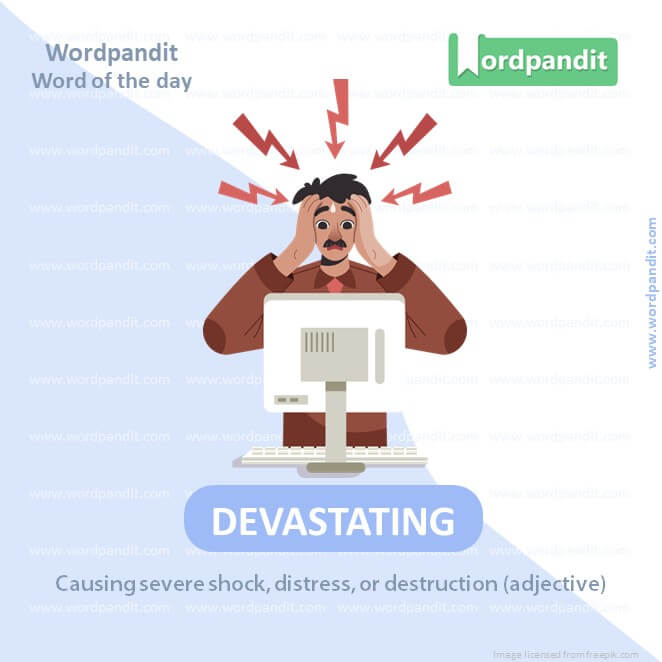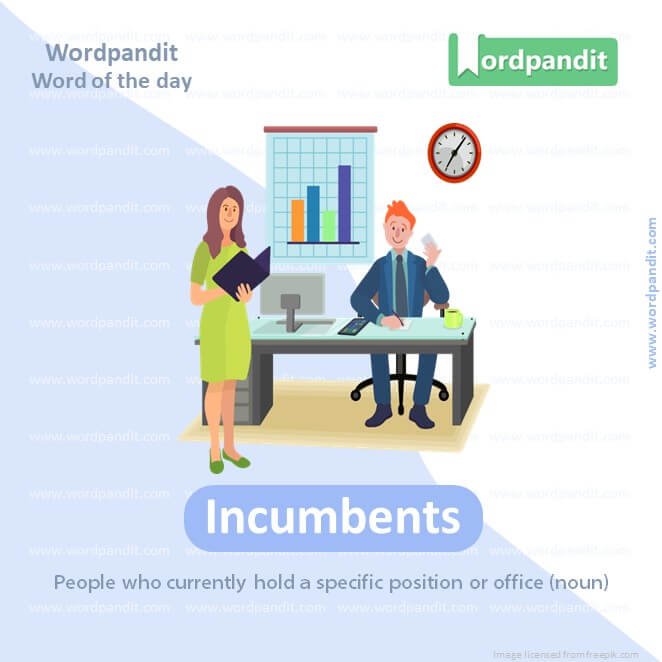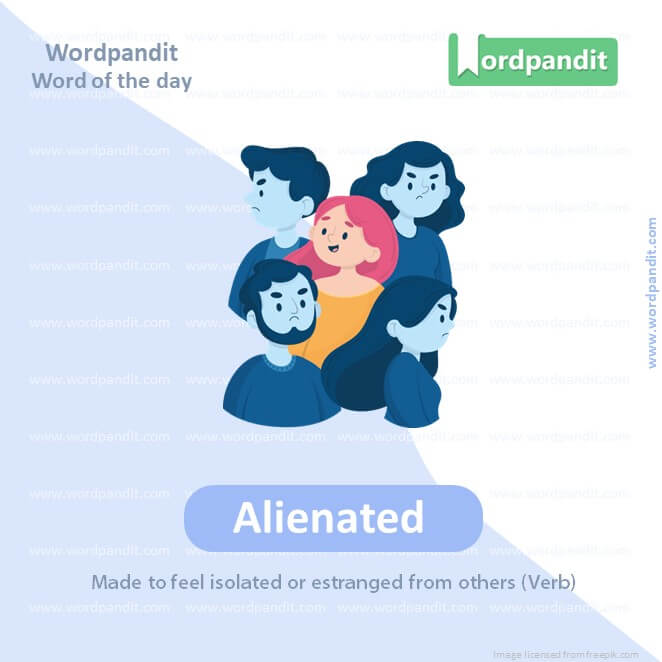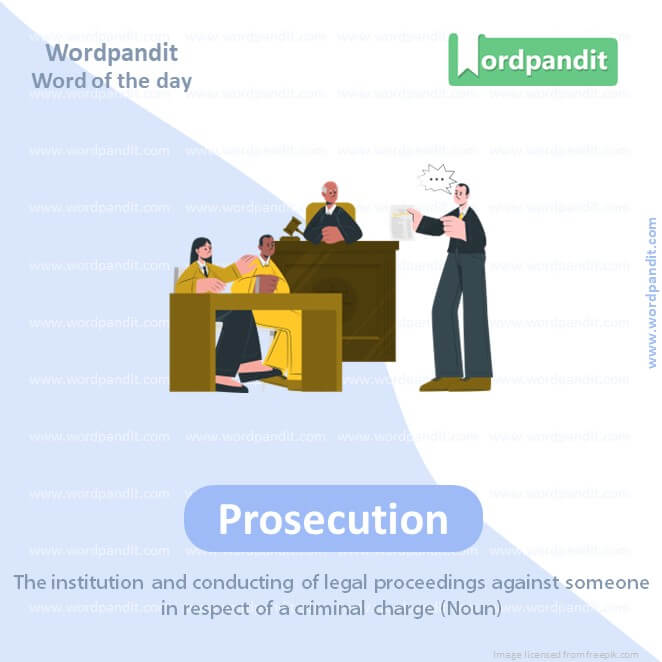Daily Vocabulary Words: List of Daily Used Words in Leading International Newspapers
Hi there. Welcome to this special section @ Wordpandit.
Our endeavour here is very simple: to highlight important daily vocabulary words, which you would come across in leading newspapers in the country. We have included the following newspapers in our selection:
• The New York Times
• The Washington Post
• Scientific American
• BBC
• The Guardian
• Psychology Today
• Wall Street Journal
• The Economist
We are putting in extensive work for developing your vocabulary. All you have got to do is be regular with this section and check out this post on a daily basis. This is your repository of words that are commonly used and essentially, we are posting a list of daily used words. Hence, this has significant practical application as it teaches you words that are used commonly in leading publications mentioned above.
Visit the website daily to learn words from leading international newspapers.

WORD-1: Devastating
CONTEXT: In 1998, the country was on the brink of collapse from a devastating financial crisis and protests that brought down the brutal and corrupt 32-year Suharto dictatorship.
SOURCE: New York Times
EXPLANATORY PARAGRAPH: Imagine a big storm that knocks down trees, blows roofs off houses, and causes a lot of damage. Everything is messed up, and people might feel very sad or shocked by how much has been destroyed. This kind of big, harmful impact that really upsets or damages things is called devastating. It’s like when something happens that is so bad, it makes you feel really sad or hurts a lot of things or people.
MEANING: Causing severe shock, distress, or destruction (adjective).
PRONUNCIATION: DEV-uh-stay-ting
SYNONYMS: destructive, ruinous, disastrous, catastrophic, harmful, damaging
USAGE EXAMPLES:
– The hurricane had a devastating effect on the coastal town.
– Her criticism was devastating to his confidence.
– The wildfire’s devastating path left many homes in ruins.
– The news of the accident was devastating to everyone involved.
WORD-2: Sprawling
CONTEXT: Ethnic and religious violence across the sprawling archipelago raised the specter of Balkanization or a military crackdown.
SOURCE: New York Times
EXPLANATORY PARAGRAPH: Imagine a city that keeps growing bigger and bigger, with houses, shops, and parks spreading out in every direction, covering more and more land. This wide spread of buildings and areas, stretching far and wide, not just in one tight place, is called sprawling. It’s like when you lay out all your toys across the floor, taking up lots of space everywhere.
MEANING: Spreading out over a large area in an untidy or irregular way (adjective).
PRONUNCIATION: SPRAW-ling
SYNONYMS: extensive, spread-out, rambling, widespread, expansive, dispersed
USAGE EXAMPLES:
– The sprawling city was difficult to navigate without a map.
– They lived in a sprawling mansion on the outskirts of town.
– The university’s sprawling campus included several parks.
– The vineyard was part of a sprawling estate.
WORD-3: Archipelago
CONTEXT: Ethnic and religious violence across the sprawling archipelago raised the specter of Balkanization or a military crackdown.
SOURCE: New York Times
EXPLANATORY PARAGRAPH: Imagine a group of small islands close to each other in the sea, like little pieces of land floating on the water where people can live, have adventures, or go on vacation. This group of islands is called an archipelago. It’s like having a collection of tiny lands you can explore, each one with its own special features, animals, and plants.
MEANING: A group of islands (noun).
PRONUNCIATION: ahr-kih-PEL-uh-go
SYNONYMS: island chain, island group, isles, island cluster, keys
USAGE EXAMPLES:
– The Philippines is an archipelago consisting of over 7,000 islands.
– They sailed around the archipelago for weeks.
– The archipelago is known for its diverse marine life.
– Each island in the archipelago has its unique culture and traditions.
WORD-4: Specter
CONTEXT: Ethnic and religious violence across the sprawling archipelago raised the specter of Balkanization or a military crackdown.
SOURCE: New York Times
EXPLANATORY PARAGRAPH: Imagine seeing a ghostly figure or a scary shadow that makes you feel a little frightened or worried about what it might mean or bring. This ghostly image or the feeling of fear it causes is called a specter. It’s like when something spooky or a worry keeps popping up in your mind, making you feel uneasy or scared about what could happen.
MEANING: A ghost or phantom; a haunting presence or prospect (noun).
PRONUNCIATION: SPEK-ter
SYNONYMS: ghost, phantom, apparition, spirit, haunt, shadow
USAGE EXAMPLES:
– The specter of the haunted house scared the children.
– The specter of war loomed over the country.
– He was haunted by the specter of his past mistakes.
– The economic crisis raised the specter of unemployment.

WORD-5: Entrenched
CONTEXT: Then, against the odds, the nation’s entrenched elites acceded to public demands for reform and the military withdrew from political life, ushering in an era of open, competitive elections.
SOURCE: New York Times
EXPLANATORY PARAGRAPH: Imagine a rule or a way of doing things that has been around for a very long time and is very hard to change because everyone is used to it. This deeply established or firmly fixed way is called entrenched. It’s like when you have a habit that’s so strong, you do it without thinking, and it’s really hard to stop or do differently.
MEANING: Firmly established and difficult to change (adjective).
PRONUNCIATION: en-TRENCHT
SYNONYMS: ingrained, rooted, fixed, embedded, deep-seated, well-established
USAGE EXAMPLES:
– The company has entrenched practices that are hard to change.
– Entrenched beliefs can be challenging to overcome.
– The politician’s power was deeply entrenched in the city.
– Efforts to reform the entrenched system faced significant resistance.

WORD-6: Incumbent
CONTEXT: Many Republicans are thinking about his defeat at the hands of Ronald Reagan, bullish that Donald Trump also has what it takes to oust a flagging incumbent.
SOURCE: New York Times
EXPLANATORY PARAGRAPH: Imagine the person who is currently holding a job or position, especially important ones like the president or a mayor. This person, who is already in the office or role right now, is called the incumbent. It’s like when you are the captain of your soccer team this year, so you’re the one making decisions and leading the team.
MEANING: People who currently hold a specific position or office (noun).
PRONUNCIATION: IN-kum-bent
SYNONYMS: (Adjective) current, existing, in office; (Noun) officeholder, holder, bearer, occupant
USAGE EXAMPLES:
– The incumbent president announced his plans for
re-election.
– It is difficult to run against an incumbent in politics.
– The incumbent was favored to win the election.
– As the incumbent, she had a lot of experience in her position.

WORD-7: Alienated
CONTEXT: His ability to inspire his base is matched only by his ability to alienated the rest of the electorate — as evidenced by the Republican Party taking beatings in the 2018, 2020 and 2022 elections.
SOURCE: New York Times
EXPLANATORY PARAGRAPH: Imagine if you had a friend, but you started doing or saying things that made them feel left out or upset, and gradually they didn’t want to hang out with you anymore. This process of making someone feel distant or like they’re not part of the group anymore is called alienating them. It’s like when actions or words push someone away, making them feel not welcome or included.
MEANING: Made to feel isolated or estranged from others (Verb).
PRONUNCIATION: AY-lee-uh-nayt
SYNONYMS: estrange, isolate, distance, disconnect, divide, disaffect
USAGE EXAMPLES:
– His constant criticism alienated his friends.
– The new policy could alienate the company’s loyal customers.
– She didn’t want to alienate her teammates by refusing to cooperate.
– His behavior at meetings alienated him from the group.
WORD-8: Felonies
CONTEXT: This is particularly true if Mr. Trump is convicted of felonies before the election.
SOURCE: New York Times
EXPLANATORY PARAGRAPH: Imagine someone doing something really bad, like robbing a bank or hurting someone on purpose. These bad actions are very serious and are called felonies. They are more serious than just breaking a small rule, and people who do them can get into a lot of trouble with the law. It’s like the big no-nos that can make someone have to go to court or even jail because they are very serious mistakes.
MEANING: Serious crimes that are punishable by more than one year in prison (noun).
PRONUNCIATION: FEL-uh-neez
SYNONYMS: serious crimes, major crimes, grave offenses, capital crimes, high crimes
USAGE EXAMPLES:
– The court found him guilty of committing multiple felonies.
– Felonies include crimes like robbery and murder.
– Being convicted of a felony can result in significant jail time.
– The police department has a special unit to investigate felonies.
WORD-9: Competency
CONTEXT: In order for Mr. Biden to steady his campaign and overcome doubts that Mr. Hur’s words will exacerbate, the president needs a strategy to at least neutralize these concerns about his age and mental competency.
SOURCE: New York Times
EXPLANATORY PARAGRAPH: Imagine you’re really good at building tall towers with blocks, knowing exactly how to stack them so they don’t fall over. This skill or ability to do something well, like building block towers or solving math problems, is called competency. It’s like being able to do something successfully because you know how and have practiced it.
MEANING: The ability to do something successfully or efficiently (noun).
PRONUNCIATION: KOM-puh-ten-see
SYNONYMS: capability, proficiency, skill, expertise, ability, adeptness
USAGE EXAMPLES:
– The job requires a high level of technical competency.
– Competency in languages is advantageous for this role.
– The training program aims to improve the staff’s competency.
– Assessing the competency of new hires is essential for the team.

WORD-10: Prosecution
CONTEXT: It said prosecution would be inappropriate “even if Department of Justice policy did not foreclose criminal charges against a sitting president.”
SOURCE: New York Times
EXPLANATORY PARAGRAPH: Imagine if someone breaks a rule or law, and then there’s a group of people who work to show that this person really did something wrong and should be responsible for it. This process of trying to prove in court that someone did something bad and deciding what should happen to them is called prosecution. It’s like when someone has to explain and prove that they saw you break a rule so that everyone knows what really happened.
MEANING: The institution and conducting of legal proceedings against someone in respect of a criminal charge (Noun).
PRONUNCIATION: pros-ih-KYOO-shun
SYNONYMS: legal action, litigation, legal proceedings, suing, indictment
USAGE EXAMPLES:
– The prosecution presented evidence against the accused.
– He was on the side of the prosecution in the trial.
– The case was dropped due to lack of prosecution evidence.
– The role of the prosecution is to prove the defendant’s guilt.
Vocabulary Hard Words
The experience of unraveling the depths of language learning often leads us to ‘vocabulary hard words’. These challenging jargons might seem daunting initially, but with the right learning strategies, the enigma of ‘vocabulary hard words’ can turn into an enticing quest. But how can these ‘vocabulary hard words’ be learned effectively?
Firstly, to master ‘vocabulary hard words’, it’s vital to break down the process into manageable steps. Instead of tackling several words at once, focus on understanding a few each day. This gradual approach ensures effective retention and understanding.
Multimedia resources tremendously aid in comprehending ‘vocabulary hard words’. Movies, podcasts, or even music in the target language contribute a comprehensive perspective. They provide real-life contexts and usages of ‘vocabulary hard words’, making them more understandable and less intimidating.
The incorporation of memory-enhancing techniques, such as flashcards or digital apps, can significantly bolster the retention of ‘vocabulary hard words’. Such tools encourage active recall, helping to cement these words into your long-term memory. Mnemonic devices can also aid in making these words more approachable by associating the hard words with relatable images or stories.
Practice is decisive when learning ‘vocabulary hard words’. Using these words in your conversations, written communications, or even social media posts will facilitate a robust understanding and recall.
Finally, do not worry about making mistakes while using ‘vocabulary hard words’. Mistakes are essential stepping stones in the learning process. They provide insights into areas that need more focus and help refine your grasp over these words.
In conclusion, grasping ‘vocabulary hard words’ is undoubtedly a challenging task but not an insurmountable one. With the aid of effective strategies including graded learning, multimedia resources, memory-enhancing tools, and regular practice, the process of mastering ‘vocabulary hard words’ can become an engaging and rewarding journey.







